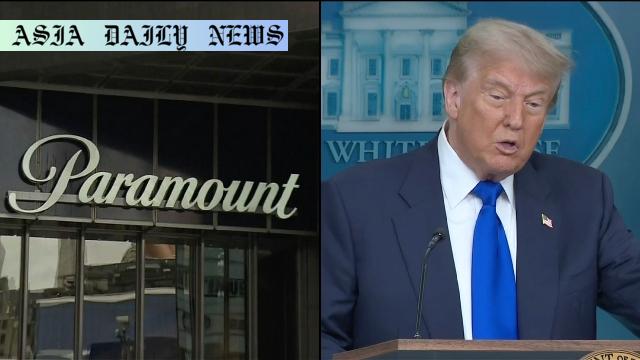Lawsuit: Trump Successfully Settles $16M Lawsuit Over Kamala Harris Interview.
Trump settled a $16 million lawsuit against Paramount Global, CBS’s parent company.
The lawsuit was over claims of deceptive editing favoring Kamala Harris before the elections.
Trump’s legal team viewed the case as a win for accountability in media.
Experts warn the decision could impact press freedom and set a worrying precedent.

Introduction: A Landmark Settlement
Former US President Donald Trump has recently achieved what his legal team is celebrating as a significant victory in holding media organizations accountable. This comes with a $16 million settlement agreement with Paramount Global, the parent company of CBS News. Trump had filed this lawsuit claiming that CBS deceptively edited an interview with Kamala Harris during her campaign as a Democratic presidential candidate in the run-up to the elections.
The controversial interview aired in October last year, just weeks before the crucial presidential elections. Trump argued that the nature of the edits made Harris appear more favorable compared to other candidates, influencing public perception and ultimately impacting the dynamic of the election. While CBS News denies any intentional misleading or unethical behavior, the company agreed to the settlement to avoid prolonged legal proceedings and costs.
The Allegations Against CBS News
At the core of Trump’s allegations was the accusation that CBS News applied an editing strategy favoring Harris, portraying her in a politically advantageous light. This fueled debates about the selective broadcasting tactics frequently used by major news outlets. Trump and his team argued such practices undermine transparency in political reporting and manipulate electorate opinions.
CBS News refuted the claims vehemently, stating their editing process complied with standard journalism protocols. Paramount Global justified its decision to settle as a financial safeguard rather than an admission of guilt. However, they stand by their actions, asserting the editing was responsible journalism, dismissing accusations of malice or favoritism.
Reactions and Concerns Over Press Freedom
The settlement has sparked diverse reactions from legal experts, media houses, and political commentators. While Trump supporters hail the agreement as a move toward accountability, many journalists and rights advocates see it as a dangerous precedent. They argue that such lawsuits, if successful, could lead to self-censorship within the media industry, potentially silencing unfavorable reporting on powerful individuals or authorities.
Experts warn this high-profile case—despite the lack of an official apology from CBS—might embolden similar legal actions against media outlets. The fear is that legal intimidation could become a weapon to suppress investigative journalism or critical analysis. Balancing the ethical obligations of the press with the dangers of frivolous lawsuits remains a contentious topic.
Legal Strategy and Implications
A key highlight of this lawsuit was Trump’s legal team’s ability to steer public narrative around corporate responsibility in the media. Trump framed this case as a broader fight against “fake news,” resonating strongly with his political base. By securing a settlement, albeit without an apology, Trump has solidified his stance as a vocal critic of perceived media bias.
Paramount Global’s decision to settle brings into question the cost-benefit analysis corporations undertake when facing politically charged lawsuits. While they avoided escalating legal expenses, CBS’s reputation and its journalistic integrity are left under scrutiny. This case sheds light on the increasing legal pressures faced by media organizations in a polarizing political environment.
Conclusion: Significance and Future Ramifications
The Trump-CBS settlement is a multifaceted case with implications stretching far beyond $16 million. Whether viewed as a victory for accountability or a threat to press freedom, it underscores the fraught relationship between politics and media. Both sides—one heralding a fight for truthful reporting and the other defending journalistic practices—remain locked in debates regarding what constitutes transparency and fairness.
In an era of widely disseminated information, the accountability of both politicians and the press is paramount. The case prompts a pressing question—how does the media ensure fair and unbiased reporting while retaining freedom of expression? The answer may shape political discourse and media practices for years to come.



Commentary
Reflecting on the Trump-CBS Settlement
The recent lawsuit settlement between Donald Trump and Paramount Global underlines an ongoing issue in modern politics and journalism—the delicate balancing act between press freedom and media accountability. On one side, holding media organizations accountable for their content is vital in fostering public trust. On the other, there’s a fine line between legitimate grievance redressal and suppressing press operations through intimidation.
Looking at the specifics of this case, the $16 million settlement highlights the financial and reputational toll lawsuits can impose on media outlets, even when they claim ethical journalism practices. While Paramount Global insists on following standard editing protocols, the lawsuit and ensuing debates cast doubt on the impartiality of such processes. This brings back age-old debates of bias in media and the potential for influential entities to weaponize media perception in their favor. Accountability is crucial, but fairness in discussions surrounding such issues is just as critical.
The Bigger Picture: Press Freedom and Legal Precedents
The dangerous precedent many experts have cited rings true when one considers the broader implications of lawsuits like these. If media outlets are repeatedly targeted for alleged bias—without conclusive proof—it could lead to a chilling effect where editorial decisions are made out of fear rather than journalistic integrity. Protecting the sanctity of free press must involve shielding against undue legal pressures while ensuring accountability standards.
Moving forward, the industry needs mechanisms to mediate disputes over editorial content in ways that preserve press freedom while offering a platform for redressal. Responsible journalism must sit at the heart of this debate. In the process, fostering trust, transparency, and accountability should remain non-negotiable priorities to bridge gaps between politicians, media industries, and the public.